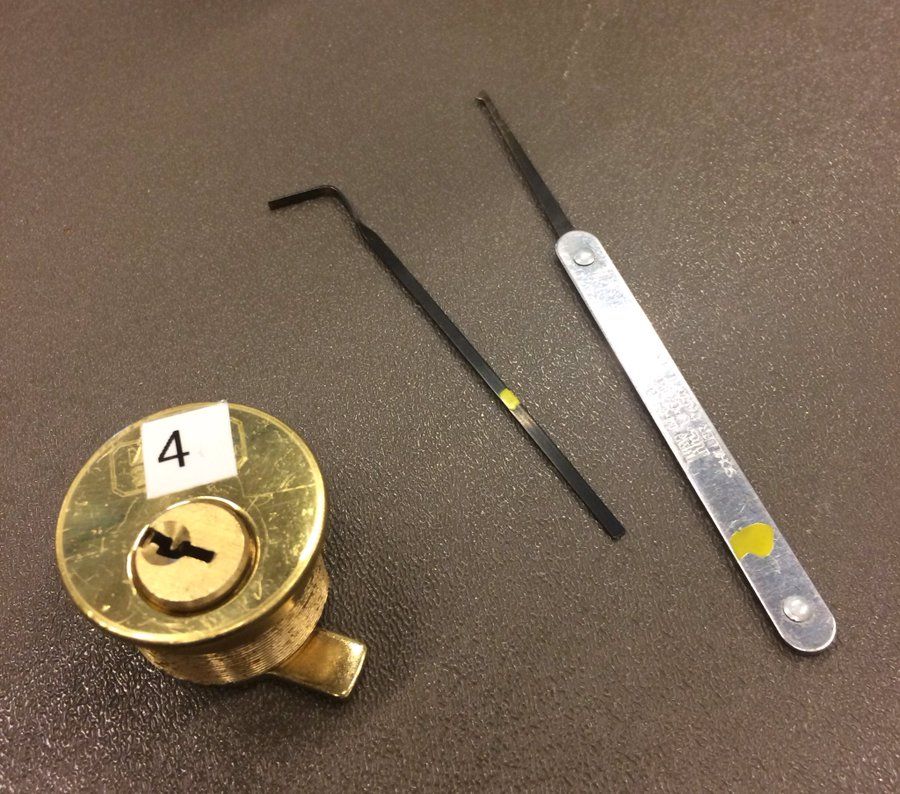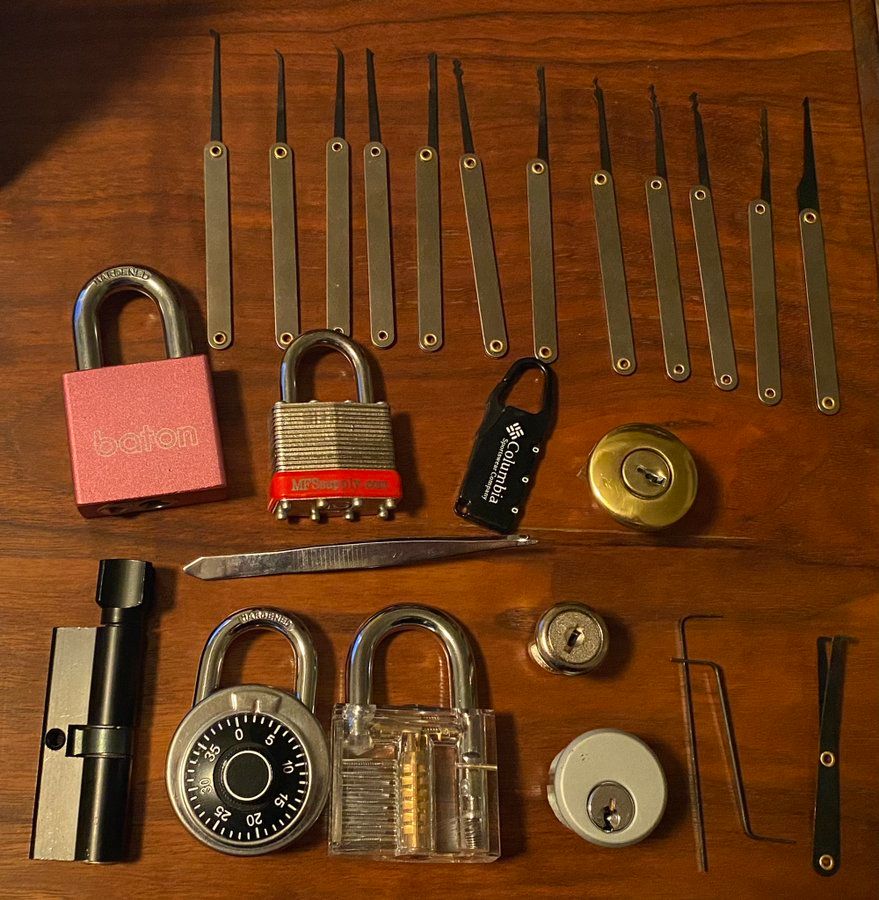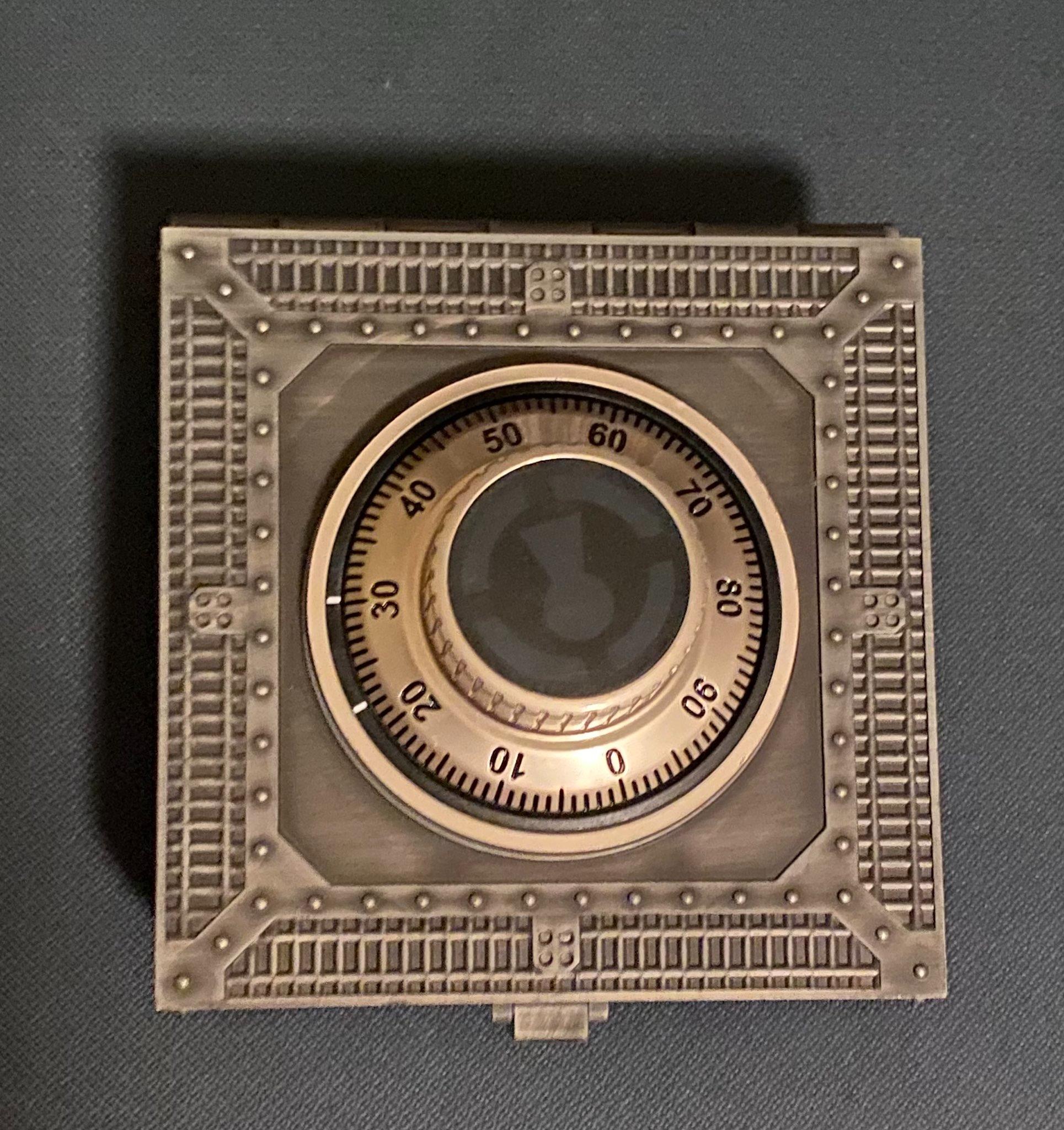Getting Started with Lockpicking
Because I've been tweeting a lot about lockpicking, folks who are interested have started asking me what gear to buy and what to do to get started.
Some people have very strong (and often conflicting) opinions about what the "right" way to get started is, but everyone is different, and ultimately this can take some trial and error on your part. This is what seems to be working for me, a novice with a few resources to share and tools to recommend.
But wait! Isn't lockpicking ILLEGAL?!
When I was in grad school, I wanted to do a video on lockpicking in my broadcast journalism class, but the instructor forbade it because she didn't realize that there's an entire community of people who pick locks for the sheer joy of it, for many of the same reasons people like to take computers or calculators apart (which, yes, would be illegal and honestly kind of rude if it was someone else's).
That said, there are different regulations by state and country, and it may be worth looking into which ones apply to you. And, of course, it's a good idea in general to avoid picking locks that don't belong to you (unless you have the owner's consent) and to avoid picking locks currently in use or which you plan on using, because things break and you might wind up in a pickle.
What's the best way to get started?
I'm not sure if I know the best way, but let's go through the options.
Hacking conferences
One way is to just show up to a hacking conference and find the lockpicking villages that have a table or two with various types of locks and picks to play with. These are often sponsored by TOOOL (The Open Organisation of Lockpickers). You might be able to catch a presentation going over some of the basics (TOOOL even makes their slides available on their website) or have some success on the easier locks by just messing around with those. There's really just nothing like opening a lock, even when you're not exactly sure how it happened. And if you're lucky enough to happen across a table that's friendly, you might be able to pick up some specific pointers on the lock you're working on that way.

Unfortunately, hacking conferences aren't always friendly spaces for women or other marginalized folx, and you may end up with a jerk at your table. (After I picked the lock above, someone informed me that using a rake pick was "cheating." And that was before the dumb sexist comments and stale handcuff jokes.)
The other issue is that your attention is always being pulled every which way at a conference, with tons of talks to hit and people to reconnect with and things going on. I am always bouncing around at these events, and it's difficult for me to sit in just one place and focus.
Local groups
You may also be able to find local meetups: look to see if there's a TOOOL chapter or MeetUp group near you, or an informal or unaffiliated group at your local hackerspace or makerspace.
It's possible that you won't find anything nearby, or won't quite jibe with the groups that you do have access to, so just remember that there are other ways to learn, including tons of books and videos and websites.
Formal classes
I don't even know how much of an option this is anymore, but I was lucky enough to find an online lockpicking class through Atlas Obscura taught by Schuyler Towne, and it was an absolute pleasure to be able to learn some of his tips and tricks. He also went into a lot of detail about ways to attack whole classes of locks, and we spent an entire class creating a theoretical lock of our own. Plus we got to make a shim out of an aluminum can and use it to open a combination lock, which was probably the coolest thing I've ever learned.
It's not clear whether or when the next course offering will be, and it may fill up or be out of your price range or not work with your schedule when it does happen... but this is an option to keep in mind.
D.I.Y.
Even if one or more of the approaches above works for you, you may want to do more than just pick locks by feel and actually understand what's happening, which may take some independent work. And, of course, you may not have much of a choice.
Luckily, there are tons of videos and books and online forums for lockpicking, and if you're the type of person who likes taking things apart (or is willing to try), you can learn at home on your own.
One perk of the class I mentioned taking was that we all got locks and picks sent to us in the mail. If you're planning on practicing on your own at home, you'll need to pick up a few things, too.
Tools

The three basic things you'll need to get started picking some locks are 1) the practice locks themselves, 2) lock picks, 3) some kind of tension wrench to apply torque and eventually turn the plug and open the lock once all the pins are picked.
Practice locks
There are two basic ways to get locks: to buy them or to ask people to give you their old ones. Whatever you do, I recommend getting the key to go with the lock and keeping it inside your lock when you're not using it so you'll be able to find it afterwards. The key will help you figure out how the pins stack up, which is really important if you're not using a clear or cut away lock (which has part cut out so you can see what's going on). And even if you are using a clear or cut away lock, at some moment of frustration you may want to turn the key to see what things are supposed to look like
Types of locks
There are all sorts of fun things you can mess around with, like safe locks and bike locks and handcuffs and combination locks and dimple locks and so on and so forth, but a lot of people start with things like wafer locks, pin tumblers, mortise locks, and padlocks.
If you choose to buy practice locks, you can pick up the aforementioned clear locks or cut-away locks that'll help you see what's going on inside. (People have very strong opinions about both options and which are better and which are disastrous and won't help you, but I prefer to just pick them up and learn from my own experience.)
When you have some locks, if things are just a bit too tough, you can either remove some pins in the locks to make things easier or go back online and buy a set that gets progressively more difficult: ones with just two pins, all the way up to five or even six pins. If you're planning on removing pins yourself you'll need tweezers and some place to store them--corrugated cardboard is the least expensive if you want to d.i.y. it, but pinning mats are inexpensive, too.
Eventually once you get good at this you may want to play around with locks that have different types of security pins, such as spool pins and serrated pins, too. This will make picking a little more challenging for you. (I'm personally avoiding it for now.)
Picks
Everyone has their own favorite kits and it's easy to get way too many of them. To start, you'll probably want at least a hook pick or two, a half diamond, a couple of rakes, and perhaps a double ball. I was taught to start with metal picks rather than the rubber ones, but your mileage may vary.
Tension wrenches
For tension wrenches, I recommend getting both a couple of bottom of keyway tension wrenches and a couple of top of keyway wrenches. That's because it can sometimes be difficult to get enough space to use your lock picks with a bottom of keyway tension wrench, and you'll want to switch to the top to give yourself more space to work. (Some people use a tool that looks like a tweezer instead of a top of keyway wrench, but I personally haven't had much luck with it yet.)
Where to Buy
TOOOL US's equipment page is a good place to start for clear padlocks and dimple locks, starter kits with metal picks and tension wrenches, training locks that get progressively more difficult to pick, and a few other goodies.
Sparrow Lock Picks is a little more expensive but has very high quality tools, including starter kits, practice locks, and an entire safe cracking kit that I just picked up. They also sell pinning mats and tweezers.

AdaFruit is an amazing place to buy cool products, especially ones that help you learn electronics. It's also where I picked up a replacement clear padlock after destroying the cheap one I had.
Lockpick Tools was recommended to me. I've only bought tension wrenches from them, but the site looked good and in some cases single picks were less expensive than other sites.
CLK Supplies is another site that people have recommended to me for pinning kits and mats and other locksmithing tools (not including picks).
Resources
There are tons of books and videos out there.
Personally, I've enjoyed the MIT Lock Guide and the CIA Lock Picking Field Operative Training Manual. I also really like the animation and detail in old instructional videos by Schuyler Towne (though some are very old, and he says some of the information is wrong), the Lockpicking Lawyer's YouTube channel, and anything by Deviant Ollam (including the aforementioned TOOOL slides).
There are also a lot of intro videos to explain how to use basic tools: John Park's 2018 Intro to Lockpicking workshop (just over an hour) at AdaFruit, Lock Noob's 20-minute intro, and The Art of Manliness's 8-minute intro. No Starch Press also has a book called Locksport coming out this year which I'm very much looking forward to.
I hate to recommend Reddit since it is so often a cesspool of toxicity and negativity, but the lockpicking subreddit does seem quite lovely.
Good luck, and happy picking!